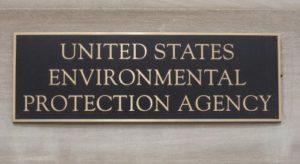With a new directive, Administrator Scott Pruitt of the EPA has revised the principles and procedures for selecting members for the Agency’s 22 advisory committees, which include the Science Advisory Board (SAB), Clean Air Scientific Advisory Committee (CASAC), and the Board of Scientific Counselors (BOSC), three bodies that have had a profound impact on how science is factored into EPA’s regulatory actions.
Perhaps the most significant new provision listed by Pruitt is a prohibition on membership in any EPA committee for any individual currently in receipt of an EPA grant as a principal investigator, coinvestigator or in a position that would otherwise “reap substantial direct benefit from an EPA grant.” The bar would not be applied to state, tribal, or local government agency recipients of EPA grants.
In a memo accompanying the directive, Pruitt wrote that members possessing EPA grants “create the appearance or reality of potential interference with their ability to independently and objectively serve as a [Federal Advisory Board] member. In a news conference following release of the documents, Pruitt said that a total of $77 million had been provided in grants to members of the SAB, CASAC, and BOSC.
Broader Geographic Representation
According to the memo, membership on an EPA advisory committee will adhere to three additional principles and procedures:
- Committee balance should reflect prominent participation from state, tribal, and local governments.
- Emphasis should be given to individuals from historically unrepresented or underrepresented states and regions.
- Membership should be rotated regularly to encourage and promote the inclusion of new candidates with fresh perspectives and to avoid prolonged and continuous service.
“With these improvements to EPA’s federal advisory committees, the Agency is taking another step to provide the public with a better, more effective government,” wrote Pruitt in the directive.
Critics of CASAC
Pruitt’s directive comes as no surprise. In May 2017, the administrator informed nine of the 18 members of the BOSC that their 3-year terms would not be renewed; under previous administrators, renewal of membership was virtually automatic.
But Pruitt has been receptive to calls to bring different perspectives into the conduct of science at the Agency. For example, in July 2017, three Republican members of the Senate Environment and Public Works Committee (EPW) wrote to Pruitt that the CASAC has failed to meet its statutory obligations to provide advice on the adverse social, economic, or energy effects related to the Agency’s 2015 revised National Ambient Air Quality Standards for ozone.
“CASAC must be constituted of experts who can provide independent counsel [on those effects],” wrote the senators.
In response to Pruitt’s announcements, EPW Chair John Barrasso (R-WY), one of the authors of the letter, said the directive will ensure that the unique perspectives of Wyoming and other rural states are not left out of the Agency’s policy making process.
‘Greatest Minds’ Left Out
The EPA has not officially released the names of any individuals being considered for committee membership. However, The Washington Post reported that it obtained a list of potential candidates “from multiple individuals familiar with the likely appointments.” The list includes at least two individuals have who have worked for major oil companies and one who has worked for a large electric power corporation, according to the article.
Some organizations are particularly concerned about the ban on scientists receiving EPA grants because they are the very individuals whom the Agency has previously determined know the most about environmental science.
“Why would the administrator of an agency whose mission is to protect public health and the environment actively work to ensure that some of our greatest minds wouldn’t be allowed to advise him on pressing scientific questions?” said Genna Reed, an analyst with the Union of Concerned Scientists. “No need to ask Pruitt, just ask his friends from the regulated community who have been working to turn conflict of interest on its head at the Agency in the name of ‘balance.’”
Pruitt’s directive and memo are available here.

